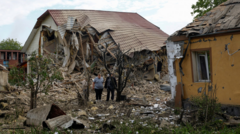Over the past week, Indian security forces have reportedly killed at least 58 people during operations against Maoist militants in Chhattisgarh state, prompting concerns over potential civilian casualties amidst a push to eradicate the insurgency by March 2026.
India Accelerates Military Operations Against Leftist Insurgency

India Accelerates Military Operations Against Leftist Insurgency
A renewed military campaign in India has claimed the lives of dozens as the government seeks to dismantle a long-standing Maoist rebellion ahead of a set deadline.
In a significant escalation of military efforts to combat Maoist insurgents, India has witnessed a surge in deadly confrontations in recent weeks. On Wednesday, security forces killed at least 27 individuals in a targeted operation in central Chhattisgarh, aimed at dismantling the decades-old leftist movement. According to Prabhat Kumar, the local police chief, several prominent Maoist figures were either killed or injured during this military endeavor. Among the deceased was Nambala Keshav Rao, also known as Basavaraju, a leader of the insurgency.
Last week, another offensive resulted in the deaths of 31 suspected militants in a rugged zone that straddles Chhattisgarh and an adjacent state, further solidifying the government's aggressive stance. India's Home Minister, Amit Shah, described this previous confrontation as a “historic breakthrough” and emphasized an ambitious timeline for complete insurgency eradication by March 2026.
However, this aggressive military approach has drawn criticism and concern from human rights advocates, who are calling for a thorough investigation into the identities of those killed in these operations. Bela Bhatia, an attorney engaged in regions plagued by the insurgency, expressed apprehension regarding the timely identification of casualties, highlighting the government's frequent delays in releasing bodies for family identification. This has raised alarms about the potential involvement of innocent civilians in the recent casualties attributed to the government's crackdown on Maoist rebels.
Last week, another offensive resulted in the deaths of 31 suspected militants in a rugged zone that straddles Chhattisgarh and an adjacent state, further solidifying the government's aggressive stance. India's Home Minister, Amit Shah, described this previous confrontation as a “historic breakthrough” and emphasized an ambitious timeline for complete insurgency eradication by March 2026.
However, this aggressive military approach has drawn criticism and concern from human rights advocates, who are calling for a thorough investigation into the identities of those killed in these operations. Bela Bhatia, an attorney engaged in regions plagued by the insurgency, expressed apprehension regarding the timely identification of casualties, highlighting the government's frequent delays in releasing bodies for family identification. This has raised alarms about the potential involvement of innocent civilians in the recent casualties attributed to the government's crackdown on Maoist rebels.




















